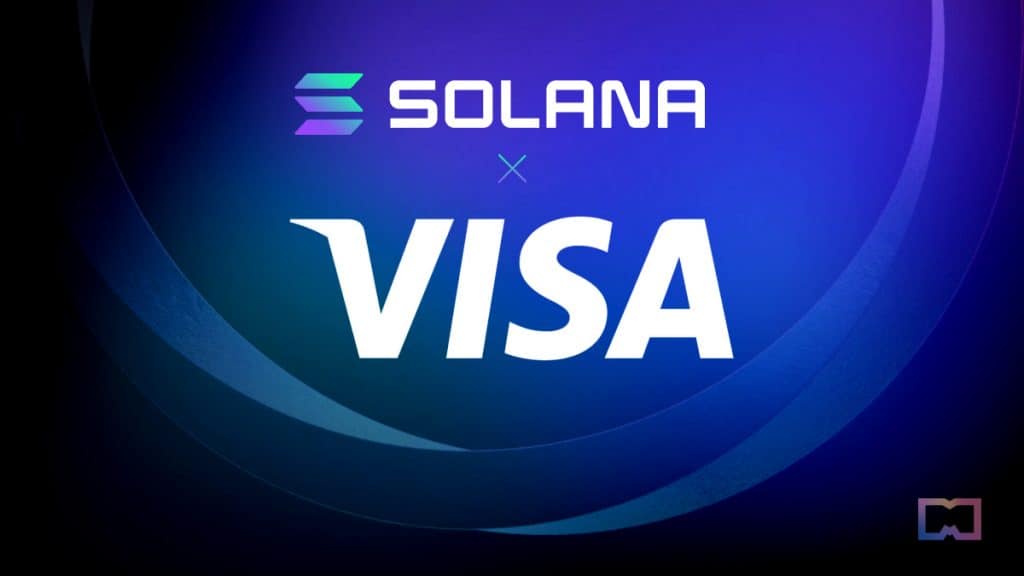Visa Expands Stablecoin Settlement on Solana through Worldpay and Nuvei


In Brief
Visa has announced that it is expanding stablecoin settlement to the Solana blockchain.
The digital payments company will also be working with merchant acquirers Worldpay and Nuvei to enable card settlements for merchants.

Visa today announced that it is expanding its stablecoin settlement capabilities to the Solana blockchain.
Prior to this, Visa said that it already facilitated the transfer of millions of USDC across the Solana and Ethereum blockchain networks to settle fiat-denominated payments that were authorized via VisaNet.
The company said it chose to add support for Solana for its “high performance,” citing the blockchain’s speed. According to SolScan, the Solana blockchain maintains 400 millisecond block times and achieves an average throughput of 400 transactions per second (TPS).
“By leveraging stablecoins like USDC and global blockchain networks like Solana and Ethereum, we’re helping to improve the speed of cross-border settlement and providing a modern option for our clients to easily send or receive funds from Visa’s treasury,” said Cuy Sheffield, Head of Crypto at Visa, in a statement.
The company explained that its treasury and settlement systems enable the clearing, settlement and movement of funds between the consumers’ bank (the issuer) and the merchant’s bank (the acquirer).
Visa’s USDC Settlement Pilot
In 2021, Visa launched a pilot program with Crypto.com to explore the utility of USDC with its treasury operations. The program leveraged USDC and Solana to receive payments from Crypto.com for cross-border payments on their live card program in Australia.
Visa reported that the pilot project achieved success. This resulted in Crypto.com now utilizing USDC to fulfil its settlement obligations for Visa cards in Australia.
As per the company’s statement, cross-border purchase settlements were costly and time-consuming before the pilot program was implemented.
Currently, Crypto.com can send USDC cross-border over the Ethereum blockchain directly to a Visa treasury-managed Circle account. Visa claims that this reduces the time and complexity of international wire transfers.
Partnerships with Global Acquirers
Building on the Crypto.com pilot, Visa has begun another pilot program that involves using its Circle account to conduct purchase settlements on the Solana blockchain.
To achieve that, the company has partnered with global acquirers Worldpay and Nuvei. These acquirers serve a number of merchants worldwide across different sectors. This includes Web3 merchants such as on-ramp providers, games, and NFT marketplaces that may prefer receiving stablecoins for card payments they accept.
Visa said that it is using its own Circle account to manage card settlement payouts in USDC to Worldpay and Nuvei. The acquirers will then route these payments in USDC to their end merchants, speeding up transaction times.
“Stablecoins like USDC are cutting edge payments technology that can enable online businesses around the world to accelerate their growth,” said Philip Fayer, Chair and CEO, Nuvei. “Optimizing cross-border transactions is only one use case where stablecoins can benefit businesses.”
Over the past few years, Visa has been actively experimenting with blockchain technology. In August, the company completed a test of a new solution that enables users to settle gas fees using their credit or debit cards.
Disclaimer
In line with the Trust Project guidelines, please note that the information provided on this page is not intended to be and should not be interpreted as legal, tax, investment, financial, or any other form of advice. It is important to only invest what you can afford to lose and to seek independent financial advice if you have any doubts. For further information, we suggest referring to the terms and conditions as well as the help and support pages provided by the issuer or advertiser. MetaversePost is committed to accurate, unbiased reporting, but market conditions are subject to change without notice.
About The Author
Cindy is a journalist at Metaverse Post, covering topics related to web3, NFT, metaverse and AI, with a focus on interviews with Web3 industry players. She has spoken to over 30 C-level execs and counting, bringing their valuable insights to readers. Originally from Singapore, Cindy is now based in Tbilisi, Georgia. She holds a Bachelor's degree in Communications & Media Studies from the University of South Australia and has a decade of experience in journalism and writing. Get in touch with her via cindy@mpost.io with press pitches, announcements and interview opportunities.
More articles

Cindy is a journalist at Metaverse Post, covering topics related to web3, NFT, metaverse and AI, with a focus on interviews with Web3 industry players. She has spoken to over 30 C-level execs and counting, bringing their valuable insights to readers. Originally from Singapore, Cindy is now based in Tbilisi, Georgia. She holds a Bachelor's degree in Communications & Media Studies from the University of South Australia and has a decade of experience in journalism and writing. Get in touch with her via cindy@mpost.io with press pitches, announcements and interview opportunities.





















































